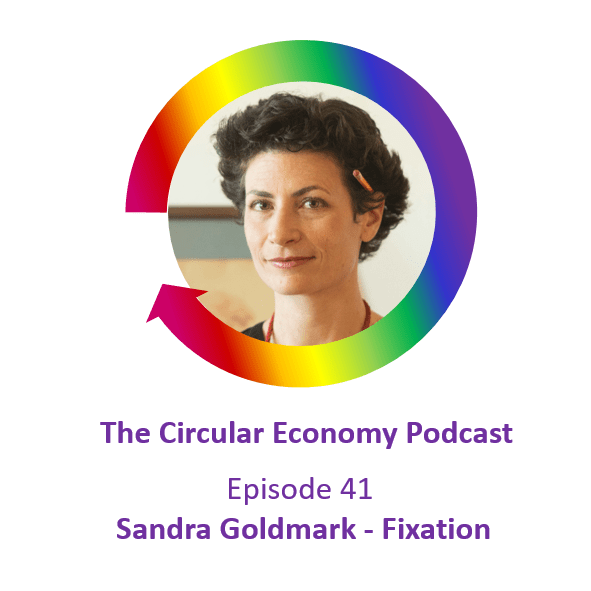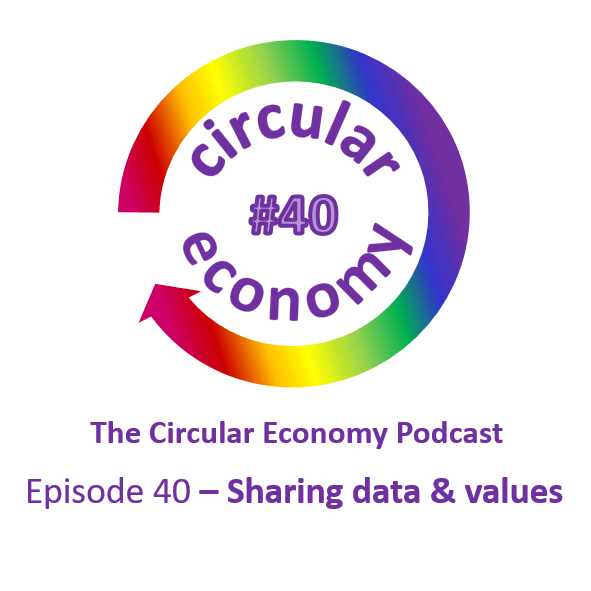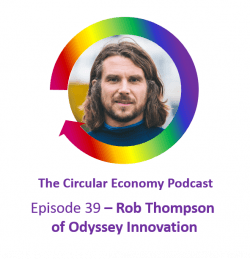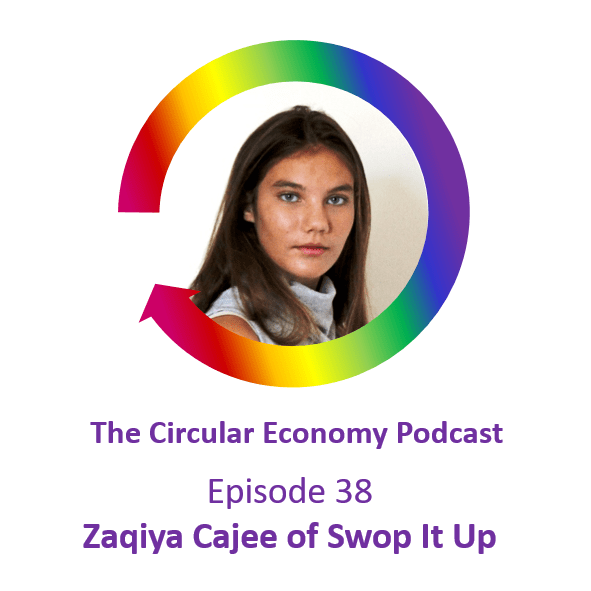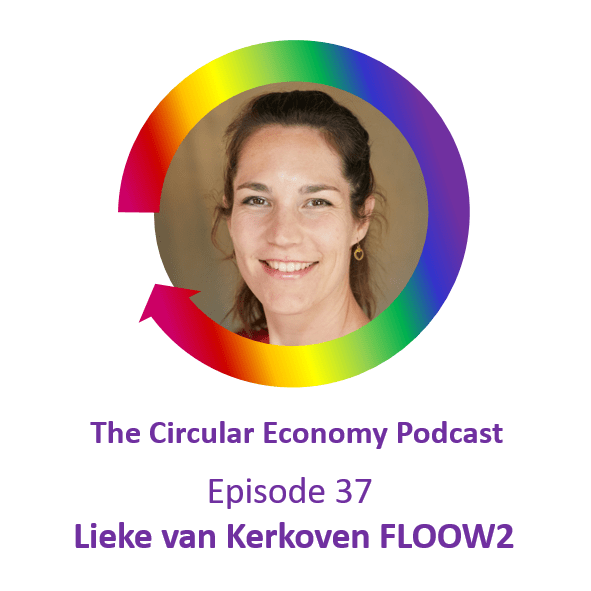Podcast: Play in new window | Download
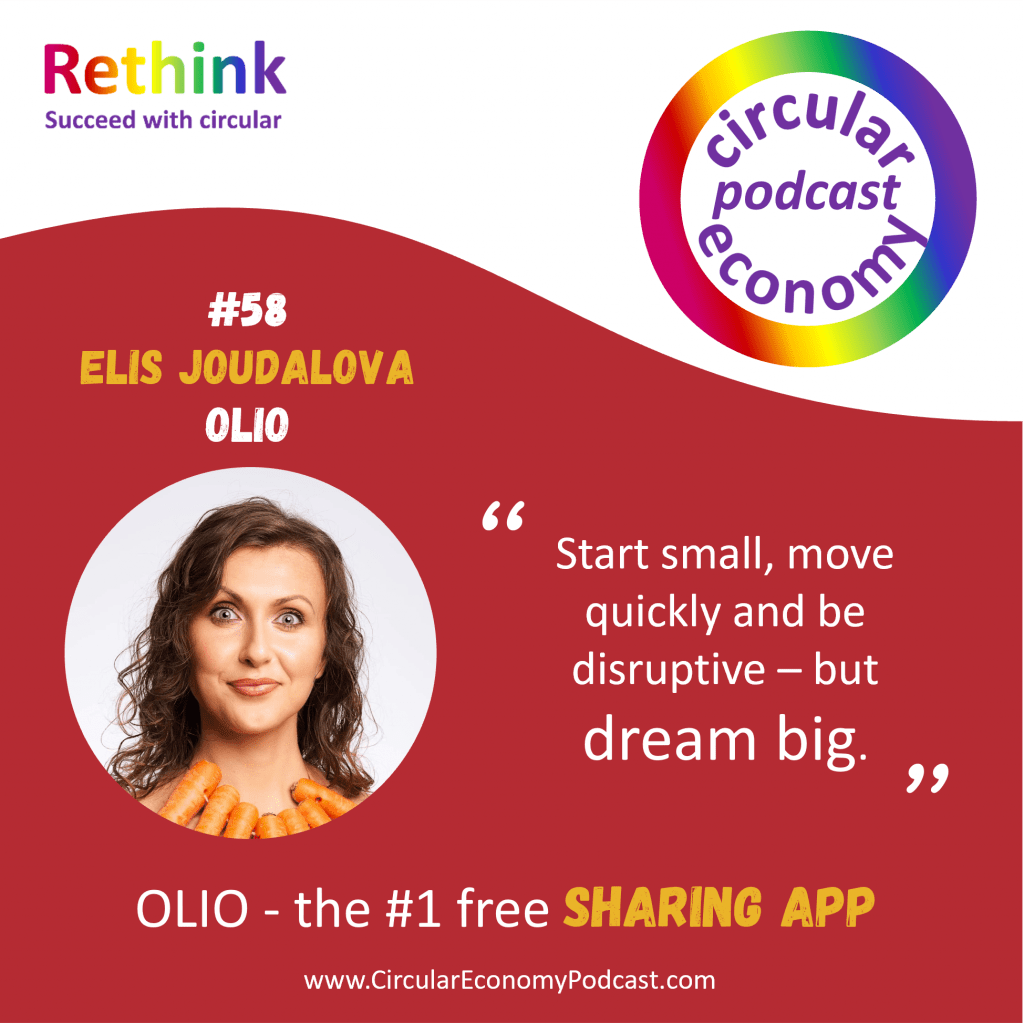
Catherine Weetman talks to Elis Joudalova about OLIO, the #1 sharing app. OLIO connects neighbours with each other and with local businesses so surplus food can be shared, not thrown away. This could be food nearing its sell-by date in local stores, spare home-grown vegetables, bread from your baker, or the groceries in your fridge when you go away. OLIO can also be used for non-food household items.
Elis looks after Market Growth & Partnerships for OLIO, and has kickstarted, grown and managed strong food sharing communities in Jersey, Guernsey and Stockholm. Elis is a sustainability, food waste and circular economy change-maker with a contagious passion for food, environment, community empowerment and systems thinking. She loves inspiring and empowering people and businesses to make a change, focuses on the long term vision and has a unique entrepreneurial approach to solving problems.
On top of that, Elis has been helping The Prague Innovation Institute in analysing CE initiatives, to support the City of Prague’s strategy for a Circular Economy.
We’ll hear how OLIO got started, using Lean Innovation principles and a great example of a Minimum Viable Product to test the concept. We find out how it works in practice, and what motivates people and businesses to use OLIO. And Elis explains how it’s evolved, how it’s managing to be COVID-secure, and shares her top tips for going circular.
Podcast host Catherine Weetman is a circular economy business advisor, workshop facilitator, speaker and writer. Her award-winning book: A Circular Economy Handbook: How to Build a More Resilient, Competitive and Sustainable Business includes lots of practical examples and tips on getting started. Catherine founded Rethink Global in 2013, to help businesses use circular, sustainable approaches to build a better business (and a better world).
Stay in touch for free insights and updates…
Read on for a summary of the podcast and links to the people, organisations and other resources we mention.
You can subscribe to the podcast series on iTunes, Google Podcasts, PlayerFM, Spotify, TuneIn, or search for “circular economy” in your favourite podcast app. Stay in touch to get free insights and updates, direct to your inbox…
Don’t forget, you can use our interactive, searchable podcast index to find episodes by sector, by region or by circular strategy. Plus, there is now a regular Circular Economy Podcast newsletter, so you get the latest episode show notes, links and transcript delivered to your inbox on Sunday morning, each fortnight. The newsletter includes a link to the episode page on our website, with an audio player. You can subscribe by clicking this link to update your preferences.
Links we mention in the episode:
- A Circular Economy Handbook: How to Build a More Resilient, Competitive and Sustainable Business – buy from any good bookseller, or direct from the publisher Kogan Page, which ships worldwide (free shipping to UK and US) and you can use discount code CIRCL20 to get 20% off. It’s available in paperback, ebook and Kindle. If you buy it from online sources, make sure you choose the new edition with an orange cover!
- Sign up to get the podcast player and shownotes for each new episode emailed to your inbox
- CILT International – Catherine’s 15 minute webinar on ‘Why Successful Businesses are Circular and What that means for Supply Chains’ (Catherine’s section starts at 4:45 https://www.facebook.com/ciltinternational/videos/2979685385684431
- Elis Joudalova on LinkedIn https://www.linkedin.com/in/elis-joudalova-95a10563/
- OLIO website https://olioex.com/
- So how does OLIOs food sharing app actually work? Check out this 30-second video.
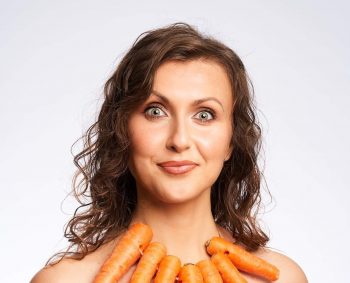 About Elis Joudalova
About Elis Joudalova
Elis is a sustainability, food waste and circular economy change-maker with a contagious passion for food, environment, community empowerment and systems thinking. Elis enjoys public speaking and loves inspiring and empowering people and businesses to make a change. She believes in genuine collaboration and disruptive innovation. Her key strengths are her unique entrepreneurial approach to solving problems and long term visionary thinking.
Elis has kickstarted, grown and managed strong food sharing communities in Jersey, Guernsey and Stockholm with the aim to reduce and solve the issue of food waste via her involvement and several roles in the OLIO start up. She was a finalist of the Jersey Pride Awards in 2017 and 2018 under the Environmentalist of the Year category.
She he was invited to be a speaker at the 10th Annual Forum of the EU Strategy for the Baltic Sea Region that aimed to reinforce cooperation in the region via embracing the concept of circular economy in order to tackle common challenges.
In 2020 Elis was selected into the EMF’s programme designed to empower the next generation of circular economy leaders and pioneers.
Recently Elis became a member of the founding team of the new ambitious community initiative and SDGs think tank that focuses on solving urgent societal issues and connecting the missing dots.
About OLIO
OLIO began as a food sharing app, connecting neighbours with each other and with local businesses so surplus food can be shared, not thrown away. This could be food nearing its sell-by date in local stores, spare home-grown vegetables, bread from your baker, or the groceries in your fridge when you go away. OLIO can also be used for non-food household items.
Interview Transcript
Provided by AI – add 3:35 mins for the finished episode
Catherine Weetman 00:04
Welcome to the circular economy podcast.
Elis Joudalova 00:07
Hi, Catherine. Thank you for having me.
Catherine Weetman 00:09
And where are you talking to us from today? I’m calling from Jersey Channel Islands. nice and sunny today. Yeah, we’ve we’ve had the glorious sunshine for two or three days. But now it’s it’s cloudy again. So that didn’t last long. So I’m curious to know, first of all how OLIO got started, because it’s quite a while ago now, isn’t it? Can you tell us a bit about the story of OLIO got started, because it’s quite a while ago now, isn’t it? Can you tell us a bit about the story of OLIO??
Elis Joudalova 00:38
Yes, absolutely. It’s been, yeah, time flies, some sort of almost five, six years now. So OLIO was founded by two very inspiring, amazing women, Tessa Clark, and Saasha Celestial-One. And I’ve heard the story. And it’s kind of fascinating. So just so I was moving in 2014, from her apartment in Switzerland, back to the UK. And they were packing everything and there was still some food left. And she comes from a farm, she grew up on the farm, and her family was always no resourceful. And she really didn’t like the idea of having to bring the food they didn’t manage to eat, and she didn’t know the neighbours. And she just paused and thought, I wish there was an app that I could share my spare food with others. And that’s really when the idea of alia was born, she told her best friend Sasha about it. And she was very excited also coming from a resourceful American family so really liked the values. And they incorporated the company in 2015, they did some basic desk research about the food waste to start with, and they were really shocked by the scale of the problem. They created a little whatsapp group to just test the idea and proof of concept with dozens of people in North London just to see if they would like to share food between themselves and if they liked the idea. And it went really well. So the basic app was then built and launched in the summer 2015. So really kind of nice story of seeing the problem, she had that problem of not being able to share the food with anyone and creating a solution. So yeah, I really like that. And the core. And key aim of that really is to connect neighbours with each other and with local businesses. So surplus foods and also other items, non food items can be shared and not thrown away.
Catherine Weetman 02:49
Yeah, so there’s a few strands to it. Now that isn’t there. So first of all, it’s interesting that the whatsapp group was the kind of pilot for that. So in true lean and frugal innovation style, get going without without having to build anything. So that’s great. So MVP. Exactly, exactly. So can we dig into a bit more about the so we he said food and other things? So what kind of what kind of other things are you seeing being exchanged?
Elis Joudalova 03:23
So yeah, the app was created to share, to really reduce food waste, and to share food to start with, but then the founders quickly realised there are other things, people binning, and there is life to them, which are non food items. So we have more and more people sharing their pre left toys and books and anything, you can think of people who donate to charity or potentially put on a cycle Facebook page, so all sorts of things and even plants and when people are moving. So yeah, there is a range of things being shared every day, really.
Catherine Weetman 04:06
And you talked about between neighbours and with local businesses. So could you unpack that a bit for us? Yes.
Elis Joudalova 04:15
So we only are tackles two sources of food waste, really. So it’s, we call it C to C customer to customer and b2c. So they’re the platform is used by users sort of households. So anybody can download the app for free and share their unwanted food or non food items with others. We all found ourselves with cooking too much about too many things or going on holiday and still have a few items to spare. So people just take a photo of the item they want to give away put a quick description, where it is and when available for collection and other users. To receive a notification for back end, they can see all the items listed around them in real time. So they can request from others via private messaging and arrange collection. And then for businesses. We have a food waste hero programme, which enables businesses to achieve really zero edible food waste. So we have a fully trained teams of volunteers who collect the unsold food at specific times and bring it back to their home and ensures the food is safely redistributed to others sort of same way. Like I just mentioned households, so they take pictures of the items, store them, of course properly, and others can request and collect from their doorstep.
Catherine Weetman 05:52
Right on what kind of are you able to give us any brand names of the retailers involved? or?
Elis Joudalova 06:00
Yeah, we work with many of the retailers you guys are, of course, busiest market and where OLIO was born, and then Channel Islands and Sweden, so it’s from supermarkets to coffee shops. We are also fed Hawks. Also ad-hoc collections, even wholesalers monthly big collections. Last year, we had a successful pilot with Tesco in the UK, so we actually collect from 1000s of their stores. Pret a Manger was one of our first ones. Little cafes. Yeah, many, many places I work in Jersey, we work with Coke, and even Waitrose. So yeah, and there is the one more I can’t say the name yet. But very exciting, big player joining us very soon. So yeah, which
Catherine Weetman 06:54
sounds good. So it sounds like it’s, you know, really move forward over the last five or six years. And I know you’re you started the one in Guernsey and jersey, and where else is it operating around the world? Can you give us…
Elis Joudalova 07:11
We are very excited that we keep, of course looking where where OLIO is being used and how much and the latest data is that it’s been used in 59 countries. So it’s pretty fascinating. Yeah, free app. I mean, around the world. I guess most people don’t use apps these days. So free to go out and people can just start sharing in a minute. So UK is the busiest and then we have as we mentioned chill islands, Sweden, specifically Stockholm, Mexico and South America growing very, very fast. Singapore, New Zealand, Spain. Yeah. We’ve shared a now over 21 million portions of food around the world. And we excited to just hit 4 million users.
Catherine Weetman 08:03
Wow, that’s brilliant. And what what motivates people to use OLIO? I’m guessing the motivations are perhaps different for what you know, we’ve got three groups of people, I guess, somebody that donators, the recipients or users, and then the volunteers. So what what’s driving people?
Elis Joudalova 08:24
It’s great question. And think yeah, it’s can be different between all three. But there are some some similarities. I think the number one, which is the same for all of these parties, that really nobody wants to see the food going to waste even businesses. I was really pleasantly surprised when I started in Jersey, they really disliked winning food, it’s not like they enjoy it. And staff don’t like doing it but there was just not very easy way for them to to redistribute it then. So they want to give back to their communities. And it’s a topic very talked about customers demand really, as well. supermarkets to do better, and they want to see the sustainable efforts with the power of social media. You know, customers are really on it. I think these days, if they see some food being thing they call out to the companies, and it’s part of their CSR and ongoing food waste through reducing initiatives and of course, globally or within EU. There are big, big targets and part of SDGs and it’s also a great thing for employee engagement. We did some research before any staff is really enjoying doing doing good and giving food to others rather than building it. User wise predominantly people want a are really conscious of the massive issue of food waste and consumption as such. So they also don’t like burning food, or their non food items, lots more and more people giving food and non food items away these days, across and other things. At the same time, they like to make other people happy, it’s a great feeling that somebody picks up food or non food item from you and really give it a second chance. And for the users who request items, there are many motives. They like to reduce food waste, and at the same time, who doesn’t like little freebie free fruit is expensive. And some users of course use it because they actually need a little help. We have many students, single parents, and some times we all been there, little financial difficulties, which was very, you know, for live, and during Corona, many of us were furloughed, or lost jobs. So we had many more users joining us.
Catherine Weetman 11:07
So I’m curious, do you have any stats to say how many people do both donations and collections or or, you know, get to use the food? How many people would fit in both camps?
Elis Joudalova 11:23
Interesting, we’ve done some of this research. And when the new user sign up, we ask the person if they joining audiology predominantly give or request, and it seems to be I believe, I don’t have that latest one. But people like to do usually both. Or say they want to do both. It’s pretty much 5050. It depends.
Catherine Weetman 11:48
That’s good. So that’s removing the stigma, say around, you know, taking, just taking donations, and people may be feeling that. You know, because there’s a stigma around going to food banks and things like that, isn’t it? Oh,
Elis Joudalova 12:05
absolutely. Yeah, that that is one of the greatest feedbacks I’ve had locally, how the people, so there is people who go to charities and really need that help, usually, but there is a big part of the community who is just in between, you know, being perfectly fine financially, and needing help from charity, and they love how anonymous the the app has been, and how easy it was to collect some food. And it helped many people the amount of messages and think you saw that, from people who just found themselves in a little situation. Yeah, it was pretty emotional. So it does cover that that sort of a little bit forgotten part of the community.
Catherine Weetman 12:54
And is it bringing people together? Who wouldn’t have met otherwise? Are you are you hearing stories of any community networks, kind of, indeed,
Elis Joudalova 13:04
I was gonna mention it now with regards to volunteers. So volunteers mainly join us to also, you know, it’s a great movement, it’s a very fun way. And it’s like a tool, empowering people to really make a difference and belong to a great friendly sort of food sharing community. And well, we all always want to make it fun. So one of the reasons, of course, again, reducing food waste and give back during COVID. Interestingly, more volunteers were joining, because they just wanted to support each other even more, which was great to see. And before COVID, many people join because they wanted to meet their neighbours, and just, it absolutely brought the community together seeing it firsthand in Jersey and Guernsey and I had some fantastic stories from people who said, I’ve just didn’t, you know, retired people or people who just didn’t know where to put their time to. And they said it just got them out of bed. And some people who were even having depression, they said it absolutely changed their life. Meeting people at the door and new friends. I got so many friends now for life through through volunteers, and even the businesses who joined us. So it’s been fascinating, of course, since COVID, we kind of had to adapt and there was no contact sharing, rather than meeting at the door and passing the bags with food. But yeah, hopefully we’ll get back to it soon.
Catherine Weetman 14:40
Yeah, brilliant. And it’s great that you came up with ways to circumvent the virus transmission worries and things like that. So that’s, that’s brilliant. So Elis, I’m curious to know how you got involved in all this. Yeah, well, good. So
Elis Joudalova 14:59
it was not good. was yesterday, but it’s now literally been four years. Since I’ve gone too early. Oh, well, I come from my family very close to food. mum always grew food, we have a massive garden and just cooking is a big part. So I moved to UK when I was 19, I started studying at university and I just saw how food waste is much more around. And the food is packaged differently the way it’s sold. And I realised that yeah, it’s just so much of it going to waste and I just didn’t realise it or saw it back home. And it was really bothering me. I moved to Jersey seven years ago, and it seemed to be the same thing. I used to go shopping late in the evening, and so much food was reduced. And I used to talk to the staff like, Oh, are you taping this home, and you know, what’s gonna happen with this food, and they all didn’t really want to talk about it. But it seemed that it was going to be bent. And I found that absolutely shocking, because maybe JC seems like an affluent Island. And it is, but there is still as everywhere else, people in charities, who would do with the food and pineapples still being green. Are they saying that, you know, that’s today, it needs to be taken off the shelves. And I found it really disturbing. I had ordinary office job and I didn’t really feel fulfilled. Even though I studied something on sustainability. There wasn’t any opportunities in Jersey for me at the time. So I thought I will try to make a difference in this era food waste in my free time. But logistically connecting 30 cents a block is was tricky. And you know, when you set your mind into something, they say universe is going to bring you some solution. And I just don’t to all your online and I thought it was a genius and I had a call that the founders if I can try to grow it in Jersey. They said, Well, of course Go for it. And I remember on immigration, I just went out, thought it would be really tricky to get it going. And within a month we had a supermarket and cafe on board, I was collecting food, giving it out and having my full time job at the same time and getting volunteers on board spreading the word wearing all the hats. It was one of the most exciting times in my life really. And from then on OLIO was super impressed. They were surprised to what’s happening in June, the data’s going, going crazy. And they wanted me to join their team, but they were not prepared I was going to appear. So there was no real opportunity. And at that time, so I still decided to leave my job, all I could think of was food sharing. I couldn’t sit in that office anymore. Knowing this was just a voluntary role for the time being. But I thought to myself, you always want to make a difference. This is so you, you’re so passionate about it, just do it just, you know, take the leap of faith. And I did that. And at the end of the day, it all happened. Puzzle Pieces came together, I got employed by OLIO. And then I was offered to grow on your own guaranteed. So I was struggling to NZ then also to Stockholm in 2019. And it’s been a fantastic journey I would have. I’m so glad I did that leap of faith. So I was part of the international expansion team and sort of market growth manager was my title. And then we start up always fast paced and challenging. So I wore many hats and worked with within the events, sort of food waste for events. And now I’m part of the partnerships team. And I’m sure there’ll be other other parts. I’ll get involved in it sometime.
Catherine Weetman 19:01
Yeah, that sounds like a kind of very, very busy and I can’t think of the word that springs to mind. But no, just one one thing led to another led to another getting up and running. So that’s very rewarding. Yeah, absolutely was and still is. Yeah, I like that image of all you could think of was was food sharing. That’s a better a better image than all I could think of was food waste, which doesn’t sound very attractive now to have on your mind. But yeah, food sharing is, is more motivational, isn’t it? So Elis, what kinds of things have you struggled with? And what surprised you in the process of building the business and, you know, that could come from either your perspective with jersey, Guernsey and Stockholm, or from the wider perspective of OLIO as a whole
Elis Joudalova 19:57
interesting question. We could talk a lot Uh, well, I could talk about lots of things here. But the main one for me within the markets or communities have been growing or managing myself. You mentioned stigma before. So that was at the start definitely there. But also on another hand. So there are 12,000 users now in Jersey, for the small island, absolutely fascinating. But sometimes there’s days that we have amazing food being shared. And the team says, and it’s quiet, it’s quiet. And I was like, why nobody wants this food, I’m sure they want the food. And I did some research and talk to people who I know that go to the app, like, Can you see the food? You don’t know? Can you Why don’t you request it, we needed to be gone. And people started telling me that they love what we’re doing. But they just feel bad. Because they have money and they want to leave the food for someone else who might need it. So there was this I call it lovely Britishness that people, you know, giving you to go first, they wanted to give chance to each other to a habit. And then at the end of the day, nobody was requesting not as many people as we needed. So I kept sharing, this is environmental, cause it’s all about reducing food waste, think of plenty for all we share with charities and cooperate, cooperate with everyone who might need it. But please, everybody take a bit. So yeah, that was a bit of a struggle to start with. But now I think the message is clear. And people, a lot of people jump on when we have loads. And surprise, I think the surprise was at the very start how quickly and smooth it was and how actually, everybody wanted to join the you know, the movement and all the stores are actually interested to join us, rather than me having to convince them. So many people volunteered, literally hundreds of people given their time, and still do and the dedication and commitment. I will always be surprised by that. And positive word. We have never had a negative word from anyone just yeah, women for all including businesses, volunteers, and users. So yeah, that’s, that’s just a brilliant, brilliant surprise.
Catherine Weetman 22:26
Yeah. Thank you. That’s, that’s, that’s really interesting. And I think the point about people feeling bad and hesitating, because they’re thinking, well, I can afford this. So am I depriving somebody who needs it more than me? That’s a really tricky one to solve, isn’t it? And, you know, maybe the there might be things you can do with the, with the app, I don’t know, to allow people to hesitate. But But you know, if nobody takes this a bit like kind of reverse reverse bidding on eBay, or whatever, but you know, I’ll have this if nobody else wants it, because I don’t want to see it go to waste. But I’m happy to be in the queue. Yeah, yeah. But it’s, we’ve done certain things. You kind of need Second Sight, don’t you before you press the button to say I’ll have this? Yeah, I
Elis Joudalova 23:17
think people do ask or give it a go then when when it’s clear that there’s more than one thing, so we tend to them. Now there is a way to say, Hey, we have 150 cucumbers, and people go by actually, I guess I should help them. And by taking a few so it’s gone better. And maybe it was just where I am based? I don’t know. I don’t think I’ve heard anything like this. In the UK. But yeah, maybe the small community here and maybe more affluent people live here as well. They were just being nice and you know, caring about others, I guess.
Catherine Weetman 23:54
Yeah, that’s that’s interesting. And thinking about other businesses wanting to go circular or start something circular. What top tips would you share? Elis,
Elis Joudalova 24:08
there is many we’ve learned as always being a startup, one way you do is constantly adapt and learn. As you go and have to be resilient. I think we all learned through COVID. But technology is extremely powerful, because, of course before OLIO, there were opportunities for supermarkets or other places to share with charities and they did but it just wasn’t as seamless or quick. So that technology made it super efficient. Everybody can see it quickly and spread the word about what we do and social media as well, extremely quick, but the main one is really that. I think the bottom up approach and grassroots movements that empower communities to really be the change they want to see in your world. They Do many work, we always end you know, within circle economy, it’s all about, you know, governments and retailers leading the way. And everything changes from the start and the whole system should change for the fastest change. And it is true. But if it’s not happening yet, why not just stand up, bring a solution and work with it with the community. So starting small moving quickly and being disruptive, but dreaming big, we have a massive vision. And that’s kind of vital, and then it’s inevitable, then it’s going well, and it’s all about impact and doing good that others won’t just will leave sooner than later join, including the government. We’ve seen it here. So once OLIO was vacant, doing so great. Government wants to talk to me, and can we do more? We should think about this. So yeah, sometimes it’s both ways work very well.
Catherine Weetman 26:02
Yeah, like that. Dream big, but start small and move fast. So great tips. Thank you. Thank you, Alice. And I think about, you know, what, what’s at the heart of who you are. So your values, whether those are personal values, or alios values? Which one would you choose to talk about? And why do you think it helps us move towards a better world.
Elis Joudalova 26:29
And there’s loads, I love values. I’m all about values. But I think being purpose driven and collaborative is the key one, and it’s for me, as well as OLIO as a company, because OLIO was impact and profit with purpose business, throughout and the whole core as well as the whole team. They’re all very purpose and mission driven and very committed versus and it’s really for the financial gain. And I think that’s really important because, you know, capitalism and linear economy have created a lot of problems for us. Climate change, biodiversity loss, pollution, we can talk about inequality. And we really need to think about rethinking the way really our economic systems operate, and be ready to change our lifestyles. And yeah, it’s it’s more about it almost be more about the purpose and the future than just the, you know, the bottom line. And I like the Einstein’s quote that insanity is doing the same thing over and over again, and expecting different results. I think we all seem to have the last year, we do need to create a completely different system and our economy. So the future is better for everyone and our planet.
Catherine Weetman 27:57
Exactly. And that reminds me of my favourite podcast, outrage and optimism from the global optimism team that got together after the Paris Climate Summit. So Christiana, Figueres, Tom Rivett Carnac, Paul Dickinson, so they were interviewing Bertrand Piccard, who was the first person to fly around the world in a solar powered aircraft a couple of years ago. And he’s now working to help fund and communicate climate change solutions, and he was talking about different forms of growth. So saying that our kind of, you know, consumption driven growth is obviously bad for the planet. And people are advocating degrowth as an alternative. But that’s bad for social progress and equality and, you know, doesn’t isn’t helpful for people. And so he came up with this term for qualitative growth. So thinking about, you know, the kind of things that we want to have more of the kind of things that we want to have less of, and I thought that was really interesting concept that isn’t one or the other, because there is a lot of talk about degrowth. And I think people get switched off by that anyway, because it automatically sounds like we’re all gonna have lower standards of living and who’s gonna vote for that. But yeah, trying to think about what problems we can solve and how we can solve them in a way that helps people and planet i think is, you know, is what we should all focus on. Absolutely. Yeah. And who would you recommend as a future guest for the programme?
Elis Joudalova 29:45
I thought long and hard about that. And, of course, the big names and the famous news in mind, but then I thought about my favourite topic in food. And there is one person she is actually a Jersey girl, and she was on podcast before. And I think she’s extremely inspiring and fascinating. So I thought I will suggest her she’s called India Hamilton, and she used to be chef and she’s food system designer of local regenerative models. And she co founded with the CASPER local social enterprise enterprise called Scope, which is in Jersey, and it’s a consumer left sort of cooperative. And they’re doing incredible things within a supply of food. And they have a vibrant farm shop selling organic produce and innovative production kitchen, completely waste free. circularity is inbuilt in everything they do in terms of packaging and waste. And they do great educational programmes. And yeah, she’s extremely knowledgeable, and yet very inspiring. So maybe, yeah,
Catherine Weetman 30:58
that was India Hamilton, is that right? Great. Yeah. Okay. Well, I’ll hook up with you afterwards and ask you to introduce me because she sounds fascinating. And it would be great to have somebody on talking about regenerative food systems. And how
Elis Joudalova 31:13
And she did that in three other places? And she is going to with the chef’s Manifesto. Oh, yeah, she is absolutely fascinating.
Catherine Weetman 31:22
Great, thank you. And, Elis, how can people find out more about you and OLIand get in touch?
Elis Joudalova 31:30
Well, very easy. So we have a website, which is www.olioex.com, olioex.com, it will definitely pop up on a Google search we are on. So all social media. So again, targeting Facebook, or all your dot app on Instagram. And if you want to get in touch to the speaker with me on LinkedIn under my name, so it will be great to share to anybody interested in anything we do.
Catherine Weetman 32:00
Thank you. And I’ll put all those links in the show notes at circular economy, podcast calm, as usual, for anyone who wants to look at the spelling of your name and remember how to spell audio. Oh, well, I Oh, so great. Thank you very much, Elis. That was really fascinating to hear about the the back story of OLIO because it has been going for quite a few years. It must be one of the earliest sharing apps and it’s just gone from strength to strength into different countries and into different types of products that people are exchanging. So that’s great to hear and look forward to seeing what the next development is in the future. Thank you very much.
Elis Joudalova 32:45
Thank you so much, Catherine. Pleasure to be here.
Want to find out more about the circular economy?
If you’d like to learn more about the circular economy and how it could help your business, why not listen to Episode 1, or read our guide: What is the Circular Economy?
To go deeper, you could buy Catherine’s book, A Circular Economy Handbook: How to Build a More Resilient, Competitive and Sustainable Business. This comprehensive guide uses a bottom-up, practical approach. It includes lots of real examples from around the world, to help you really ‘get’ the circular economy. Even better, you’ll be inspired with ideas to make your own business more competitive, resilient and sustainable.
Please let us know what you think of the podcast – and we’d love it if you could leave us a review on iTunes, or wherever you find your podcasts. Or send us an email…
Podcast music
Thanks to Belinda O’Hooley and Heidi Tidow, otherwise known as the brilliant, inventive and generous folk duo, O’Hooley & Tidow for allowing me to use the instrumentals from the live version of Summat’s Brewin’ as music for the podcast. You can find the whole track (inspired by the Copper Family song “Oh Good Ale”) on their album, also called Summat’s Brewin’. Or, follow them on Twitter.
